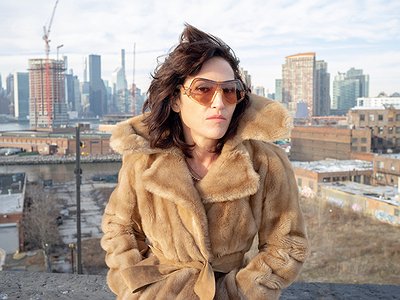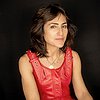Part 2
Could you take us through a day in your life, from a possible morning routine through to your work? Do you have a fixed schedule? How do music and other aspects of your life feed back into each other - do you separate them or instead try to make them blend seamlessly?
While I thrive with a fixed schedule, I don’t have a rigid one. Days basically look like this:
Wake between 7-10 depending on when I got into bed the night before
Drink water and coffee
Do yoga or calisthenics if I’m so inspired
Have breakfast and in general prep food throughout the day
Look at my ongoing list of tasks (musical and otherwise) and decide which ones are possible to complete that day and get to it
If I was working on music late into the night before, I’ll probably jump into that before doing much else
If I’m meeting Adam (engineer extraordinaire) at the studio I’ll prep food and get on my bike to ride the 6 miles there
I’ll try to get into the sun at some point as it acts as a potent anti-depressant for me
By late afternoon/early evening I’ll be getting into a groove with working on music; it may be mine or a collab or switching back and forth
This will continue through the rest of the night until the earliest midnight and the latest 4am
Sleep, repeat
I communicate with a lot of folks in my life so the day will be peppered with conversations, etc.
Right now, I can’t wait to finish this so I can get to this piece of music I’m consumed with working on …
Could you describe your creative process on the basis of a piece or album that's particularly dear to you, please? Where did the ideas come from, how were they transformed in your mind, what did you start with and how do you refine these beginnings into the finished work of art?
I wrote “Flash” which is on my third album, The Deep Field when I took a solo trip to the Yucatan Peninsula in Mexico. I went with the idea that I’d be able to write if I was removed from my regular environment. On its own, it sounds a bit like a traditional folk song but the feeling of the song when I wrote it was more transcendental and arranged it that way. I had Parker Kindred and Oren Bloedow put down a meditative groove. I reverbed out my guitar triads. The rhythmic gesture in the chorus came from Parker. I mimicked it with guttural breathing and timpani. I got a lead vocal down I was happy with and then got some of my favorite voices on it. Joseph Arthur is a great free improvisor and used a lot of his low register to enhance the vibe. I wrote cluster-y harmonies over the chorus and had Toshi Reagon, Stephanie McKay and Michele Zayla sing them. Tyler Wood added spiralling Wurlitzer and Moog, Doug Wieselman added moody bass clarinet, Timo Ellis added searing guitar. Putting all my favorite people on it is a great way to create a recording that I love.
There are many descriptions of the ideal state of mind for being creative. What is it like for you? What supports this ideal state of mind and what are distractions? Are there strategies to enter into this state more easily?
I love creating. I am not always in a state of mind to do it and that’s fine. If it’s not happening, I don’t push it. Pushing never works, only invites frustration and provides more room for the bully in my mind to reveal itself and start getting into it with me, which I don’t need help with.
I have to silence my phone and shut down all the distractions on my devices or else I’ll be ruined.
I record everything when I’m working on a song. I need a document of what happened because I must wrestle myself into a space where I’m not thinking at all; not thinking about technical stuff like recording and also not being self-critical. I’ve made the mistake in the past of believing that I’ll remember what I’ve done “if it’s good enough”. WRONG. I will not remember. The key is getting free. I need only to be free. Freedom is messy. Freedom is wild and unwieldly. I must be comfortable being terrible. I must be fine creating trash. It’s only when I return and listen with the critical part of my brain that I’ll know if I have created something worth keeping. Most of the time, I honestly have no idea what’s happening while I’m doing it.
How is playing live and writing music in the studio connected? What do you achieve and draw from each experience personally? How do you see the relationship between improvisation and composition in this regard?
Once I’ve got a basic framework, I try to keep my mind blank as to what “should” be recorded over it in terms of instrumentation. If I’ve brought a song to my band, I probably have ideas and references of what the song could sound like but I don’t want to limit it by giving guidelines. I try to say very little about the song and see what happens. If it’s not happening, then I’ll start to suggest a direction. The facets of a song that another musician can bring out are endless. I do this with myself as well. I will often pick up an instrument I cannot play very well. Recently my mind decided a song needed the sound of a 12-string. There is an electric 12-string in the studio but it’s in terrible shape. I tuned the bottom 6 strings to the song- Db-Db-Ab-Ab-Db-Db and jammed to it. 90% of what I did was trashed but 10% turned out to be magic.
Sometimes I hear a song I love (from another artist) and will immediately listen to that song to hear what I was hearing. Memory is so undependable. Often, I’ll think I’ve heard something in a song that’s not there but there is another element there that brought me to it. These references keep the ideas flowing. Never does the outcome sound anything like what I thought I might want to reference. It’s like recreating a painting but with clay instead of paints.
How do you see the relationship between the 'sound' aspects of music and the 'composition' aspects? How do you work with sound and timbre to meet certain production ideas and in which way can certain sounds already take on compositional qualities?
Certain sounds can signal era, genre, style. Using these stereotypes, if you will, to work with or against the composition is yet another way of creating vibe. I use a lot of Wurlitzer across all my albums. This sound invokes ’70’s soul and can subconsciously signal the listener to align the music with that sound. But I can also replace the Wurli with the same part played on a Juno and the vibe changes drastically. Otherwise, if I feel like the song is getting bogged down by a certain genre, I will try playing the same part on different instruments or just take out that part completely.
Our sense of hearing shares intriguing connections to other senses. From your experience, what are some of the most inspiring overlaps between different senses - and what do they tell us about the way our senses work? What happens to sound at its outermost borders?
The most obviously example of this is getting goose bumps listening to a composition. I will have heard the song a zillion times, but it can still stand my hair on end.
One of my favorite ways to listen to music is while walking along the ocean at night, especially if there is a healthy surf/ tide movement. This can bring me to a place in the music I cannot arrive at anywhere else. I assume it has something to do with the infinite feeling of the ocean’s movement that allows the music to penetrate so deeply.
Art can be a purpose in its own right, but it can also directly feed back into everyday life, take on a social and political role and lead to more engagement. Can you describe your approach to art and being an artist?
I am a lover of the human race. I do a lot of describing that love in my songs. For me, optimism is the only responsible way to be. Pessimism is like running down a dark corridor with a concrete wall at the end. Optimism allows for anything to happen. I’m always challenging myself to be more optimistic and therefore open to possibility. This doesn’t mean ignoring what’s around me. It means taking it all in and filtering it through what’s possible rather than concentrating on what’s not. It means learning how to have a critical mind fuelled by progress and communication.
I was gifted with life and I’ve only got so much time here. I’m going to do as much as I can while I’ve got the ability.
It is remarkable, in a way, that we have arrived in the 21st century with the basic concept of music still intact. Do you have a vision of music, an idea of what music could be beyond its current form?
I like the idea of “if I can think it, it’s too small” in terms of life and therefore in terms of music. My mind is not expansive enough to take on infinity, which is what music fulfils.






